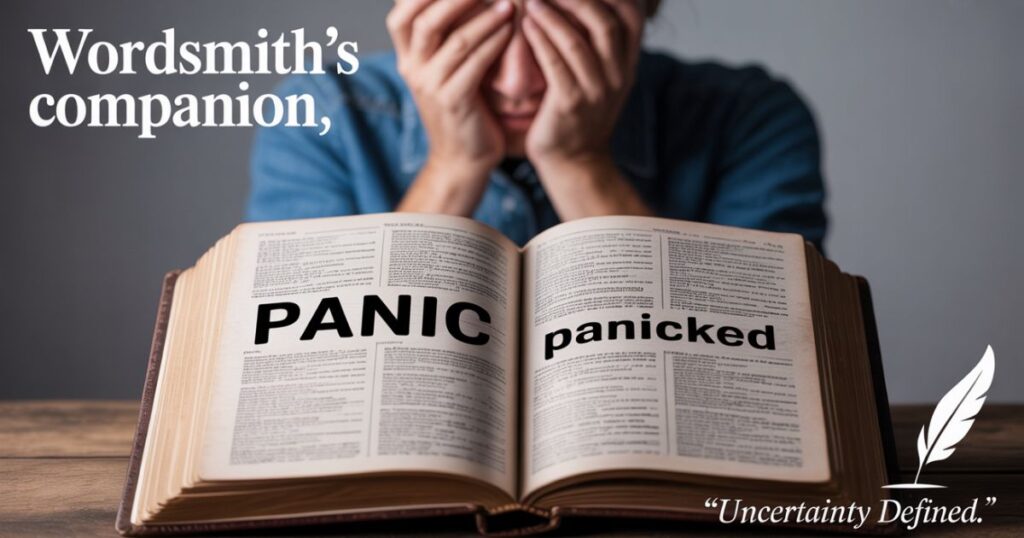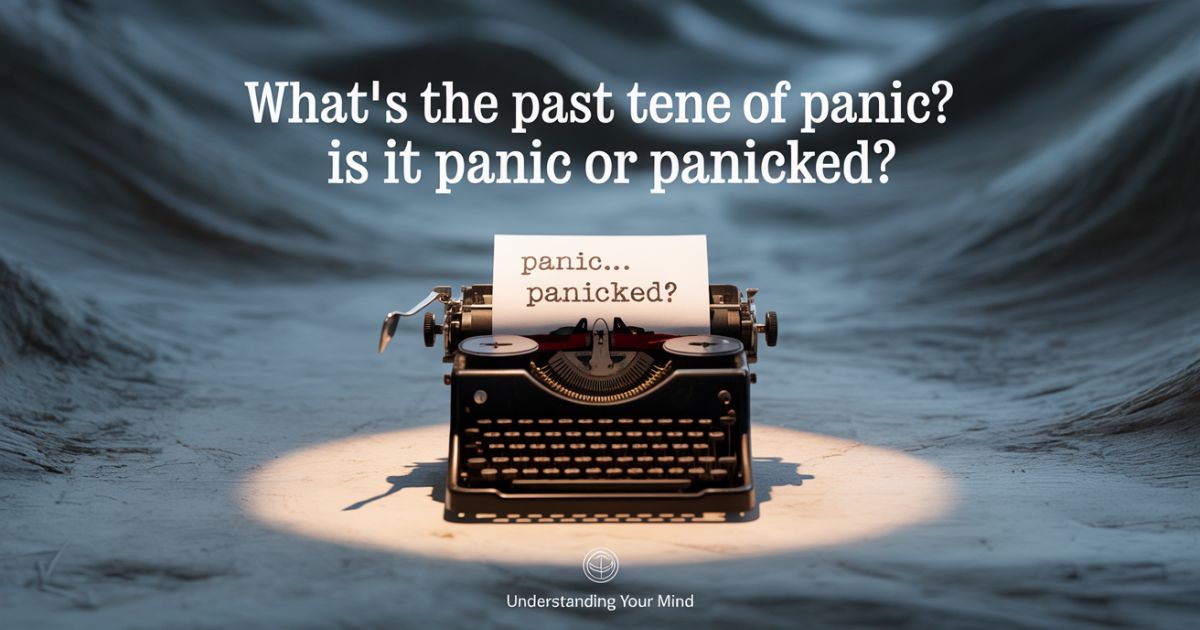Are you ever stuck wondering: panic or panicked , which one fits? You’re not alone. These two words look alike but play very different roles in English. Mastering panic or panicked can boost your speaking and writing skills instantly. Think of panic as the sudden rush of fear hitting you right now. Meanwhile, panicked tells the story of fear that already happened. Getting this right helps you sound clear and confident.
People ask all the time, “Should I say panic or panicked?” The trick lies in timing. If fear is happening now, choose panic. If it’s in the past, go with panicked. This simple tip saves you from confusing mistakes. So, whether you’re sharing a scary moment or describing a past event, knowing when to use panic or panicked makes your English shine.
Panic describes a sudden, intense feeling of fear or anxiety that takes over without warning. Imagine hearing a loud crash in a crowded place, people might freeze or rush around in confusion. That overwhelming rush of fear is what we call panic. Interestingly, the word doesn’t only relate to emotions; in botany, “panic” can also mean a type of grass called panic grass, which produces edible grains. So, this word carries more than one meaning, depending on how you use it.
Panic as a noun refers to a sudden, overwhelming feeling of fear or anxiety. It often strikes without warning, causing people to lose control or act irrationally. For example, during an emergency like a fire alarm, you might feel a rush of panic that makes your heart race and your thoughts scatter. This word captures the emotion itself, the intense fear that spreads quickly among people in stressful situations.
Interestingly, “panic” can also mean something completely different in the world of plants. It’s the name of a type of grass called panic grass, which produces edible grains. So, depending on the context, panic might describe either a powerful emotion or a kind of plant. This dual meaning shows how versatile language can be.
When used as an adjective, “panicked” describes someone who looks or acts very scared and worried. Imagine seeing a person frantically searching for their lost phone, that’s a panicked reaction. The word helps paint a clear picture of how fear shows up in behavior or expression. It tells you that the person isn’t just a little worried but genuinely frightened and reacting quickly.
This adjective often appears in everyday conversations to describe people’s emotional state during stressful moments. For example, you might say, “She had a panicked look on her face,” to explain why someone seems upset or nervous. Using “panicked” makes the scene more vivid and relatable by focusing on visible signs of fear.
As a verb, panic means to suddenly become very scared or to cause fear in others. When you panic, your body and mind react fast, you might freeze, shout, or run away. For example, if you hear a strange noise late at night, you could panic and check every room in your house. The verb form shows the action of feeling fear, not just the feeling itself.
The verb “panic” can also be used transitively or intransitively. You might panic yourself, or your actions could panic others. For instance, “He panicked when he saw the accident” shows someone’s reaction, while “She panicked the crowd by yelling” shows causing fear in others. This flexibility makes the verb very useful for describing moments of sudden fright.
Read More: Arised or Arose: What’s the Correct Past Tense of Arise?
When talking about something that happened in the past, the verb “panic” changes to “panicked.” This follows the regular rule of adding “-ed” to form the past tense. For example, you’d say, “She panicked when she saw the spider,” to show that her fear happened before now. It’s simple and clear, just like most regular verbs in English.
Adding the letter “k” before the “-ed” is important because it keeps the pronunciation correct. Without the “k,” the word might be misread or mispronounced as “pa-ni-ced,” which sounds strange and confusing. The “k” keeps the hard “k” sound intact, making “panicked” easy to say and understand.
Also, “panic” can work in different ways depending on the sentence. Sometimes, you panic yourself, like “I panicked during the storm.” Other times, you might cause others to panic, such as “The loud noise panicked the crowd.” This makes “panicked” a flexible word to describe past moments of fear, whether it’s your own or someone else’s.
The word “panic” is pronounced as /ˈpænɪk/, with the stress on the first syllable. It sounds like “MAN-ick,” rhyming with words like “manic” or “titanic.” The key is to keep the first part strong and clear, while the ending is a soft “ick” sound.
For the past tense “panicked,” the pronunciation shifts slightly to /ˈpænɪkt/. The added “k” sound at the end makes it rhyme with “picked” or “licked.” This hard “k” sound helps keep the word sharp and easy to understand when spoken aloud, making sure it doesn’t get muddled or softened.
| Tense | Example | Description |
| Present | I panic | Action happening right now |
| Present Continuous | I am panicking | Action happening right now and continuing |
| Present Perfect | I have panicked | Action completed recently, relevant to now |
| Present Perfect Continuous | I have been panicking | Action started in the past and continuing now |
| Past | I panicked | Action completed in the past |
| Past Continuous | I was panicking | Action ongoing in the past |
| Past Perfect | I had panicked | Action completed before another past action |
| Past Perfect Continuous | I had been panicking | Action ongoing until another past action |
| Future | I will panic | Action to be completed in the future |
| Future Continuous | I will be panicking | Action ongoing in the future |
| Future Perfect | I will have panicked | Action completed before a future reference point |
| Future Perfect Continuous | I will have been panicking | Action ongoing until a future reference point |
| Conditional | I would panic | Action that might happen under certain conditions |

- I felt a sudden panic when the fire alarm went off.
- There was panic in the crowd after the loud explosion.
- Don’t let panic take over during emergencies.
- Panic spread quickly when the power went out.
- She spoke with panic in her voice after hearing the news.
- The panic of losing your keys can be overwhelming.
- In moments of panic, it’s best to stay calm and think clearly.
- Investors felt panic when the stock market dropped sharply.
- Panic can cause people to make poor decisions.
- The sudden panic in the room was noticeable to everyone.
- He panicked when he realized his phone was missing.
- She panicked and ran out of the room when she saw the spider.
- I panicked for a moment before remembering where I put my wallet.
- They panicked as the deadline approached and work wasn’t done.
- The dog panicked when it heard the loud thunder.
- We panicked when the elevator suddenly stopped between floors.
- She panicked and called for help after smelling smoke.
- The driver panicked and slammed on the brakes to avoid the accident.
- Students panicked before the big exam because they hadn’t studied enough.
- He panicked when he saw the unexpected bill in the mail.
- Alarm
- Distress
- Frenzy
- Hysteria
- Terror
- Anxiety
- Dread
- Fear
- Consternation
- Turmoil
Knowing when to use panic or panicked is very important. Both words talk about fear, but they show different times. You must use panic when the fear happens now. Use panicked when the fear happened before. This rule is simple but powerful. It helps you speak and write clearly. When you choose between panic or panicked, you must think about the time you want to show. Using these words correctly makes your English much stronger.
You must practice using panic or panicked every day. The more you use them, the easier it becomes. Remember, panic shows sudden fear in the moment. Panicked shows fear that already passed. Knowing this difference must help you avoid mistakes. So, always pay attention to the time in your sentences. Using panic or panicked the right way will make your stories and conversations clearer. You must keep this tip in mind to sound natural and confident.

Grammarbeam is a smart language assistant built for clarity, creativity, and precision. From polishing grammar to exploring rich synonyms and refining sentence structure, Grammarbeam is your go-to tool for powerful communication. If you’re writing for school, business, or just for fun — let your words shine with Grammarbeam.

